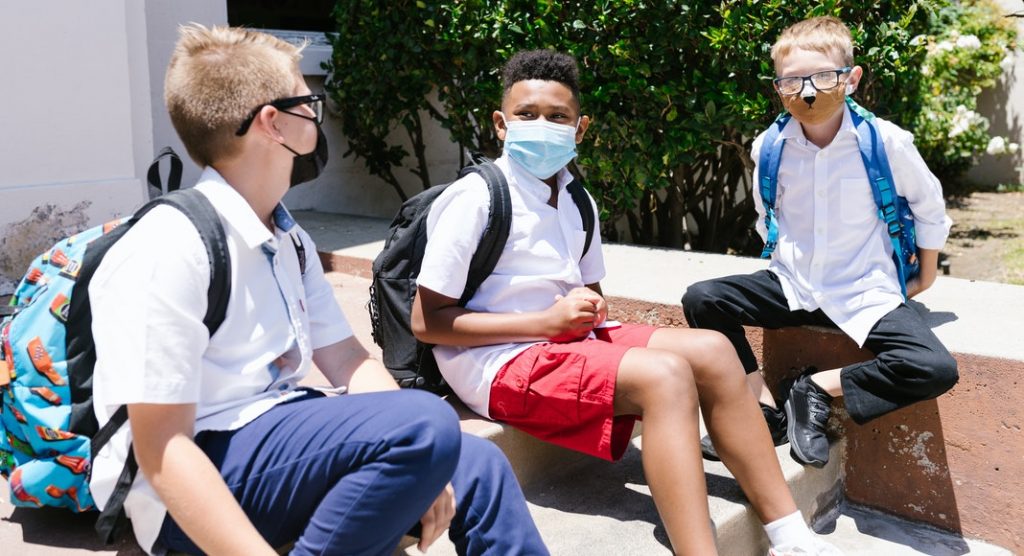 With the Delta variant, masking, and over a year of distance learning, there are a lot of reasons why kids and teens might be anxious about returning to school in person this fall.
With the Delta variant, masking, and over a year of distance learning, there are a lot of reasons why kids and teens might be anxious about returning to school in person this fall.
Here are a few suggestions on how to support our kids with this big transition.
Acknowledge their worry: Many kids, especially younger ones, haven’t yet developed awareness of their feelings. All they know is that they don’t want to go to school or that their stomach or head hurts. Try saying something like, “I wonder if you are worried about school starting. I can understand why you could be feeling a bit nervous.” Helping your child identify their feelings and reassuring them it’s totally normal to feel that way can be very encouraging.
Develop a shared language: Just as it’s hard to identify feelings, it can also be hard to talk about them. I encourage families to come up with code words for when they are feeling sad or anxious that kids can use to tell parents they are having big feelings. It can be hard for kids or teens to say, “I’m feeling really worried right now”. But something like “anxious monkey mind” can be easier to say and sometimes being a little silly can help lighten the mood. Try being vulnerable with kids about your own feelings, too. You don’t have to unload all of your parenting woes but sharing your own emotions with your kids and how you respond to them can help them learn how to communicate their own struggles more effectively.
Explore the unknowns: Usually the biggest worry for kids is not knowing what to expect. To make the unknown less scary, expose your child to the new environment before school starts, so they have a mental picture of what it’s going to be like. This could include visiting a new school, seeing the new classroom, meeting with their new teacher, etc.
Know the Rules and Practice: Going back to school this fall will look different than it has before, especially if your kids did not return in the spring. Kids will be masked, the classrooms may look different, and other things might have changed, too. Understand the rules and expectations for your child and take time to explain it to them in an age-appropriate way. Also, practice. If your child isn’t used to wearing a mask for very long, start practicing now so that is one less hurdle for them when school starts. Help them understand how far certain distances are if they will be expected to stay a certain distance apart from other students.
Connect with a few friends ahead of time: If your child has been out of the social circuit, arrange for a few playdates with classmates now before school starts. This will help ease any social anxiety they may have, and experiment with what it’s like to play with friends with masks on. If they are at a new school and don’t know other students, try reaching out to the school principal or look online for parenting groups where you might be able to connect with other kids ahead of time.
Provide a transitional object: For younger kids, having a piece of home to bring to school can help reassure them even when you aren’t there during the day. This doesn’t have to be a blanket or teddy, but rather something smaller and less noticeable, like a special watch or bracelet that reminds them of you or a note or picture they can keep in their pocket.
Include them in the back to school shopping: Letting your child pick out new masks, clothes and supplies will help them feel more invested in school starting and give them something to feel excited about, e.g, “I can’t wait to eat lunch out of my new superhero lunchbox!”
Plan the first day in advance: Make an effort to include your child in planning how the first day will go. This means letting them pick out (or buy!) the outfit of their choice and laying it out ahead of time, planning their favorite breakfast, knowing what time they have to leave and who will be driving them to school. You could even practice the drop off a few days in advance, so your child is familiar with the route and the procedure.
Arrange for a fairly busy day before school starts: Distraction does wonders for anxiety. So the day before school starts, try to plan a few activities that your child enjoys to keep them busy. This will also help them sleep better that night, too.
Organize something fun for the end of that first week: Kids often respond well to positive rewards and incentives. Plan a fun day trip or event with family or friends and include your child in the preparation. This way, regardless of how the first few days of school goes, they know they have something to look forward to.
And last of all, relax. Our kids feed off of us and our own levels of anxiety. If you seem stressed, they may sense that, which can add to their own worry. Work together to focus on the positives of the new school year, and you guys will have a great first week!
Good luck, everyone!
Do you have a question for our child psychiatrist? Please respond below or email us at info@sanfranciscomoms.com.














